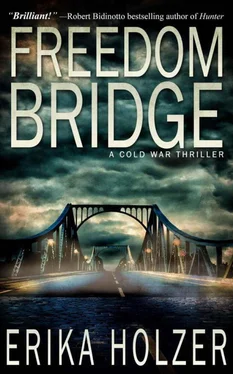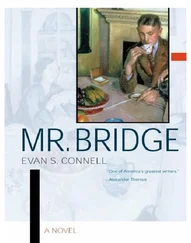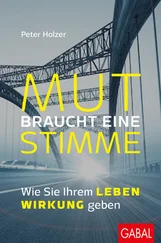Two hours later he was picked up by his trusted aide, Lieutenant Anatoly Barkov. On the way to their destination, Lieutenant Barkov explained what Aleksei had put in motion. The Russians had obtained from the East Germans a list of every patrol boat in the vicinity of Glienicker Bridge for two hours before and two hours after Stepan Brodsky’s escape attempt. The roster of every man on every boat was obtained. There were only four such boats, with a crew of four on each boat—four Schnellboots. Sixteen men.
As Aleksei and his aide sped to the dock, the East Germans were locating the boats and sending out Vopos to question the crew members. By the time they arrived at an inlet on the Havel River where the boats were berthed and serviced, one was already in dry dock for repairs.
“I have been assured that the other three boats are on their way and should arrive shortly, sir,” Barkov reported.
The two of them were intrigued by the steel-hulled vessels. Roughly thirty feet long, they had a large cabin that bristled with searchlights, loudspeakers, sirens, radar, and other electronic equipment.
Aleksei had asked for a hundred Vopos, intending to use them for turning each ship inside out as they looked for the lighter. “Where are the men?” Aleksei wondered out loud.
“On their way, Colonel. They should be here momentarily.”
Which they were. The East German officer in charge assembled his men in formation, saluted the two Russians, and said to Aleksei, “My men are at your command, sir.”
Standing in the bed of a nearby truck, Aleksei addressed the men in German. “You will divide into teams of 25 men each, one group for each boat. The other three are arriving as I speak. You are looking for a cigarette lighter. I cannot describe it because I have not yet seen it, but you will know it when you find it. Begin your search with the equipment attached to the cabin—searchlights, loudspeakers, sirens, radar, and other electronic equipment. Some of you will search the cabin. Others are to inspect every vent and drain on the surface of the boat, every place on the deck where a lighter could be hidden. If it is not on deck, you will search below deck. Dismissed.”
Turning to the officer in charge, Aleksei said, “See that bar not far from the dockyard?”
“Yessir.”
“That’s where we’ll be once your men find the lighter.”
Just as their dessert was being served, the Vopo officer rushed in.
“We have it, Colonel!” He handed the lighter to Aleksei. “And I have a theory,” he added, flushed with success. “Someone must have dropped it on the wet deck in the dark. When the vessel rolled from the strong current, the lighter slid into an uncovered drain where one of my men found it. If whoever lost it looked for the lighter in the daylight, he couldn’t have found it.”
“Sounds plausible,” Aleksei said with a smile. He shook the officer’s hand. “Please commend your man.”
As Aleksei left the bar, he kept a firm grip on Brodsky’s lighter. Once inside Lieutenant Barkov’s vehicle, he fingered the Zippo lighter, frowning at the double-eagle emblem on one side. He spun the lighter’s ridged wheel to strike the flint and ignite the device. Nothing. The wheel worked. There was a flint. Also a wick. He tried again with the same result. He studied the lighter. Opened and closed it. Turned it this way and that.
This time he pulled each working part out of the stainless steel case. Yes, there was cotton stuffing for lighter fluid that should have been able to work its way to the wick but—
Aleksei sniffed the cotton. No discernible odor of lighter fluid.
He had it—the Holy Grail!
Digging out the cotton stuffing with a fingernail, he found a tiny piece of microfilm in an equally tiny piece of sealed cellophane.
“How long to get this developed and some prints made?” he asked his aide.
“We can be at the station in a half-hour, sir.”
“I must attend an important function at the Humboldt University Medical Clinic, Anatoly. I want you to drop me off there, then have the film and the photographs delivered. But to me , no one else. And I want you to process the microfilm yourself. No one else is to see it or, for that matter, know anything about it. Understood?”
“You can count on me, sir.”
Aleksei smiled at the lieutenant’s response. It was true. He had been counting on Lieutenant Barkov for over five years.
Aleksei opened the curtains of his limousine, chasing the semi-darkness from the rear seat but admitting a different kind of gloom—a colorless landscape under a gray sky that had swallowed up an earlier promise of sunshine.
His eyes kept returning to the place next to his driver—Luka Rogov’s customary seat—now uncharacteristically empty.
He thought of Luka’s reliability. His soothing presence. His incredible strength. Just thinking of Luka’s strength gave Aleksei comfort, although he had never tried to identify the nature of that comfort.
He sat back and lit his pipe.
But as usual, along with his relaxed state of mind, memories invariably followed… .
Aleksei Andreyev was no more than three years old when he first encountered fear. He feared the fat boy on his block who’d grab Aleksei’s toys and run off with them. The skinny girl who’d kicked him in the ankle once and left a throbbing bruise. The red-bearded man who came regularly to his family’s flat, dragging huge clanking milk cans behind him. And his father—his own father!—whose booming voice and large rough hands would hoist him high in the air whenever his breath had that funny sour smell. Aleksei never wondered why such things made him feel helpless and bewildered. He took his fear for granted, as much a fact of life as the sidewalk in front of his building.
Until the day he made a double discovery. Grownups had fears too. And, wonder of wonders, he, Aleksei Andreyev , could make them afraid!
The day had started out like any other. School. Homework afterward. A visit to the home of his best friend, Ilya. The same old invitation to stay for supper. During the meal he had reached past Ilya for a platter of meat instead of asking for it as he’d been taught, and his elbow had knocked against a bowl of thick brown gravy.
Ilya’s older sister, Dasha, had leaped up in a rage. “Look how you’ve splattered gravy all over my dress, you clumsy fool!” she sputtered.
Aleksei jerked away from her, eyes squeezed shut with terror, sure that Dasha would strike him. Nothing happened. He opened his eyes a crack, then all the way. He saw it first in the eyes of Dasha’s parents, and then in hers as well. Fear . They kept pushing apologies at him. Dasha’s mother kept saying he shouldn’t tell his father. What did his father have to do with his bad table manners and the spilled gravy?
It was only when he was walking home that he realized what they were afraid of—his father. But why? Aleksei made up his mind to find out.
His father, he learned, was an early member of the Cheka in Moscow. Its full name was “The Extraordinary Commission for the Struggle against Counterrevolution and Sabotage”—whatever that meant. The Cheka was new to the Soviet Union, appearing almost immediately after the Great Socialist Revolution, and Aleksei’s father held an important position in the organization—“high-ranking,” someone told him. People spoke of it in whispers. But what did it mean?
Aleksei tried to understand what his father did but gave it up when he realized it didn’t really matter. Whatever his father’s job was, it made people like Dasha and her parents afraid. He heard two things over and over about his father. That he was a powerful man and that he was in intelligence , which meant looking into the secret activities of “counter-revolutionaries.” He shook his head over that one.
Читать дальше












